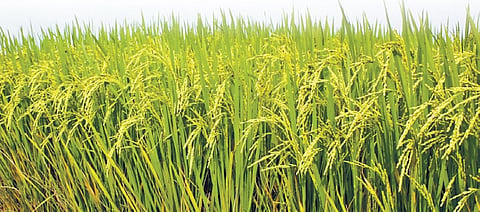Odisha: NRRI develops three climate change resilient rice types
BHUBANESWAR: In a significant breakthrough, agriculture scientists in Odisha have developed three new rice varieties that would withstand impacts of climate change. These climate-resilient varieties are expected to play a crucial role in addressing food security challenges across the country.
The new rice varieties - CR Dhan 108, CR Dhan 810 and CR Dhan 416 developed by National Rice Research Institute (NRRI), Cuttack were among nine rice varieties and 100 other varieties of bio-fortified and high-yielding field and horticultural crops released by Prime Minister Narendra Modi recently.
The development comes as a response to the increasing unpredictability of weather patterns, which have severely affected traditional rice cultivation. With rising temperature, erratic rainfall and prolonged droughts becoming more common, the new varieties are expected to enhance productivity, resilience and nutritional value in the country’s rice farming sector.
NRRI director Amaresh Kumar Nayak said the newly developed rice varieties have been engineered to thrive in extreme weather conditions. They exhibit enhanced tolerance to high temperatures, reduced water availability, and increased resistance to pests and diseases.
“These qualities make them particularly well-suited to regions prone to climatic stress. This year, we have developed eight new varieties and three among them have been released nationally,” he said.
CR Dhan 108 is a drought tolerant rice variety specifically developed for Odisha and Bihar. Useful for the upland conditions, the maturity duration of this variety is about 112 days and is suitable for early direct seeded situations of eastern India region.
“This variety has shown superiority in performance under moderate drought stress situations as compared to the best available variety Sahbhagi Dhan. As medium slender grains are mostly market preferred, it may boost the income of the farmers to a great extent,” said NRRI principal scientist Sushanta Kumar Dash.
CR Dhan 810 (Gayatri Sub-1) is a submergence tolerant rice variety, released for rain-fed shallow lowland conditions of Odisha, West Bengal and Assam. It has a maturity duration of about 150 days and productivity of 42 quintal per hectare. It is moderately resistant to leaf folders and stemborers and tolerant to neck blast which is one of the major culprits for severe yield loss in lowland conditions.
Similarly, CR Dhan 416 would be very useful to the salt affected conditions of West Bengal, Maharashtra and Gujarat with average productivity of 43 quintal per hectare.
“The varieties have been developed leveraging advanced genetic techniques to enhance resilience of the plants. Trials have shown promising results with the yielding significantly more than their conventional counterparts even under adverse conditions,” Dash added.

